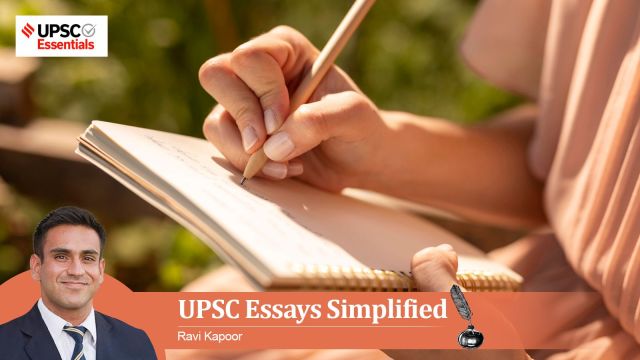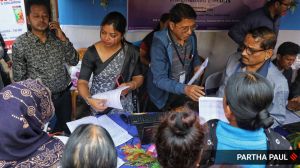Ravi Kapoor focuses on the following steps of pre-writing and writing stages which will help aspirants to write a ‘good essay’.
| PRE-WRITING STAGE (Steps 1-3) |
Step 1: Understanding and Deconstructing the topic (Previous article: Click here) |
|
Step 2: Ideation and Brainstorming (Previous article: Click here) |
|
Step 3: Structure and Flow (Previous article: Click here) |
| WRITING STAGE (Steps 4-8) |
Step 4: How to write an introduction? (Previous article: Click here) |
|
Step 5: What goes in the body? (Previous article: Click here) |
|
Step 6: How to conclude (Previous article: Click here) |
|
Step 7: Essay Extras (Previous article: Click here) |
|
Step 8: Types of content (Today’s article) |
Today, we will focus on Step 8, the second stage of writing stage for UPSC Essays.
Q. Why ‘Dimensional Analysis’ is important for UPSC Essays?
Ever so often you will find topics like ‘You cannot step into the same river twice’ in the Essay paper for the USPC exam. It may appear as if such topics can be answered with common sense alone. This is a mistake!
Philosophical or abstract topics are more difficult to write about than others precisely because they apply to so many phenomena across the board. This means that even if you address the central theme of the essay topic in the UPSC exam, there could be important aspects of it that you failed to consider.
So what type of content is best suited for such topics? A technique that exploits these patterns can come to the rescue – ‘Dimensional Analysis’.
Story continues below this ad
Q. What is a ‘dimensional analysis’ of UPSC Essays?
The human world is as complex as the human being itself. Depending on one’s proclivity and training, people look at the world through different perspectives. Just like the parable of the 6 blind men who were tasked to describe an elephant.
Since the elephant was too big an object to be held and analysed, they all described it as different objects based on the part of the animal they happened to inspect. Because of their limited perspectives, the 6 blind men came to different conclusions about the same object. One thought it to be like a rope while another concluded that the elephant resembled a tree. None of them were wrong. But none of them succeeded in painting a complete picture of the elephant either.
In a way, we are not very different from the 6 blind men with our limited perspectives.
Take the example of the Covid-19 pandemic as a differentiator:
1. To a biologist or a doctor, it is a molecular virus causing disruption in the immune system by side-stepping White Blood Cells and invading a cell to multiply and reproduce.
Story continues below this ad
2. To an economist, the pandemic might be an economic problem of supply and demand vis-à-vis hospitals and infected persons. It may point towards the stark inequality of society where the rich can sequester and isolate themselves while the poor remain vulnerable to exposure and disease etc.
3. A psychologist might see the pandemic as a challenge of large-scale behaviour change or a complex interplay of group behaviour. He/she will be concerned about psychological ways to nudge people into maintaining social distancing.
4. A spiritually oriented person might see it as a personal challenge to be overcome or depending upon their level of religiosity, an example of God’s wrath upon humanity.
Such is the nature of truth in general or for generic or ‘philosophical’ Essay topics in the UPSC exam, in particular.
Story continues below this ad
A ‘dimension’ in dimensional analysis for essay topics in the UPSC exam, is a way of looking at the essay topic – an advanced variant of the deconstruction technique. (Click here for the deconstruction article)
Q. How to classify Essays as per the dimensions?
Classifying Essays as per the content or its topic is important so as to know how a particular essay should be approached. An aspirant may use the ‘S.T.E.P.P.E’ technique to identify the dimensions.
Types of dimensions – ‘S.T.E.P.P.E’
1. SPIRITUAL:
Spirituality is a way of looking through life from a detached and objective point of view. To be spiritually inclined is to be connected to a higher and deeper sense of self. The other important things connected to spirituality are:
(a) Egolessness and a sense of freedom
Story continues below this ad
(b) Oneness with the world and a dissolution of separateness
(c) Heightened self-awareness about one’s own emotions and mental states
(d) Meditation and mindfulness practices like Vipassana, Zen etc
(e) Compassion for all beings
(f) Love for nature and a concern for environmental conservation
2. TEMPORAL (TIME):
This dimension refers to looking at the big picture and analyse the essay topic historically. It focuses on looking at collective things in large numbers instead of analysing them individually.
3. ECONOMIC:
Story continues below this ad
Individuals, businesses, and economies cannot have everything, so they are constantly forced to weigh the cost against the benefit and make choices.
These choices are made because there exists a limited number of scarce resources that can be spent once in a limited manner, like a currency spent.
Economics simply put is the study of humans and human choices. The economic dimension is you judging the costs vs benefits of any topic or argument.
Even the act of reading this article is the use of economics because making this choice indicates a belief in its cost. The opportunity cost here is of the next best thing, the other UPSC-related subjects that could have been read or the newspaper which could have been read
4. PSYCHOLOGICAL:
Story continues below this ad
Hardly any essay topic is complete without a discussion of human behaviour and thought. And that is the domain of Psychology. The Psychological dimension is about knowing oneself and how the mind works. But since the discipline of psychology is very vast, for dimensional analysis we will restrict the psychological dimension to insights of psychology most relevant for UPSC essay topics.
5. PHILOSOPHICAL:
The Philosophical dimension is used to deal directly with abstract concepts and throw light on them. In recent years essay topics like “Simplicity is the Ultimate Sophistication”.
Philosophy at its core is the quest of questioning everything at its face value to reach the truth. Philosophy is not just practiced by great thinkers or teachers, it is practiced constantly in movies, comedies, songs and books, by good employers and employees, thoughtful parents, and curious students.
Although you are not required to write like a philosopher or an academic about these abstract concepts, topics like “The rational is real and the real, rational” may require you to deal with abstract concepts directly in layman’s language.
6. ETHICAL:
Story continues below this ad
Essay topics like “Lending hands to someone is better than giving a dole” are dominated by the Ethical perspective. This topic involves a dilemma between empathy and charity. These are both values, but which is the one that should be prioritized?
Then there are cases where the principles fail to help because different people might believe in different versions of what is right. So how will we navigate the such ethical conflicts that are intertwined with philosophical essay topics?
These dimensions are universal and therefore as tools of content creation for abstract essay topics, very versatile.
Q. What is the plan for each of these dimensions in our UPSC Essays Simplified series?
Each of the dimensions need special attention. From next Sunday, we will devote one article to each of the dimensions discussed today and go into the details of the themes, so that aspirants never run out of content while writing an essay on any topic.
For today let’s just get familiar with these dimensions by using the following assignment. We shall go into details of each dimension in the upcoming articles.
The Essay Exercise
- Use the S.T.E.P.P.E dimensions for the following Essay topics and generate 3-5 keywords for each box or dimension for each essay topic.
- It is not necessary that all dimensions will apply to every topic. So, think about the dimensions that are most relevant to the topic. Cover at least 2 dimensions for every topic.
- Feel free to research about these essay topics before answering.


































